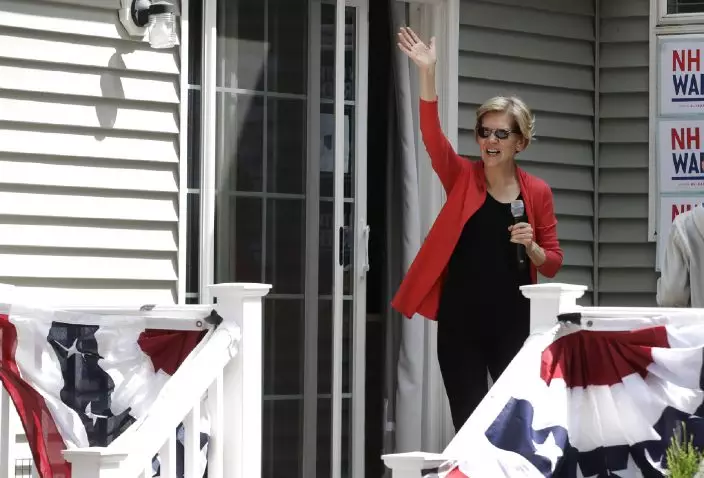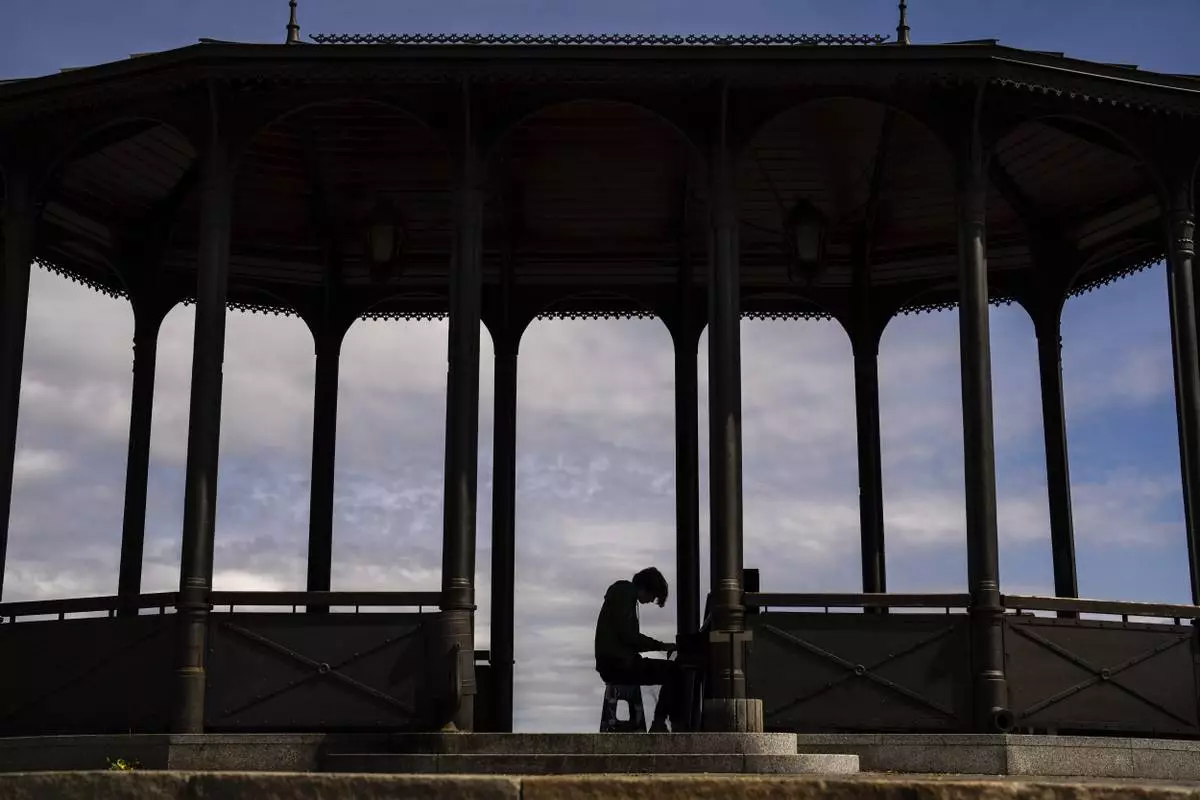Democratic presidential candidate Elizabeth Warren on Tuesday pitched a sweeping overhaul of the nation's systems for securing its elections, including the creation of a "uniform federal ballot" and the replacement of the independent commission that currently helps administer the vote.
Warren's latest in a series of hefty policy proposals — which have become a trademark as she climbs in the Democratic 2020 presidential primary polls — arrived the day before she's set to appear alongside nine rivals in the first of two highly anticipated debates . The Massachusetts senator's new election security plan gives her fresh fuel as she makes her case to a Democratic base that's keen to choose a nominee who's best prepared to defeat President Donald Trump next year.
At the heart of Warren's election security platform is the establishment of federal rules for the administration of voting, a task that's currently led by state and local officials. Warren would replace the Election Assistance Commission, created in 2002 to help states in holding their votes, with a new independent agency to safeguard balloting from online interference and ensure states comply with the federal standards she's urging.

Democratic presidential candidate Sen. Elizabeth Warren, D-Mass., speaks at the Poor People's Moral Action Congress presidential forum in Washington, Monday, June 17, 2019. (AP PhotoSusan Walsh)
"Our democracy is too important for it to be under-resourced and insecure," Warren wrote in a blog post outlining her proposal, which she's likely to discuss during a campaign town hall in Miami on Tuesday night. "We need to do everything we can to make sure our elections are convenient, professional, and secure — and we should be willing to pay for it."
Beyond the use of a systematic, federally mandated ballot, Warren is proposing requirements for "automatic and same-day registration, early voting, and vote by mail," she wrote, besides the designation of Election Day as a federal holiday. The redrawing of congressional districts would fall to independent commissions under her plan, an attempt to alleviate concerns about gerrymandering that strengthens a majority party's control.
To help ensure state compliance, Warren's plan would offer to fully fund the elections of states and localities that adhere to her new federal standards, adding extra funding for those that "achieve high percentage voter turnout."

Democratic presidential candidate Sen. Elizabeth Warren, D-Mass., speaks at the Poor People's Moral Action Congress presidential forum in Washington, Monday, June 17, 2019. (AP PhotoSusan Walsh)
Warren, who launched her presidential campaign in February, projects that her election security agenda would cost $20 billion over 10 years, using money raised by her proposed tax on the fortunes of the wealthiest 0.1% of American households. Some experts have raised questions about whether that tax would raise as much money as Warren's campaign estimates, citing concerns about the IRS' ability to effectively collect it.

Democratic presidential candidate Sen. Elizabeth Warren, D-Mass., waves as she arrives at a campaign house party, Friday, June 14, 2019, in Windham, N.H. (AP PhotoElise Amendola)
KYIV, Ukraine (AP) — A Ukrainian court on Friday ordered the detention of the country’s farm minister in the latest high-profile corruption investigation, while Kyiv security officials assessed how they can recover lost battlefield momentum in the war against Russia.
Ukraine’s High Anti-Corruption Court ruled that Agriculture Minister Oleksandr Solskyi should be held in custody for 60 days, but he was released after paying bail of 75 million hryvnias ($1.77 million), a statement said.
Ukraine’s National Anti-Corruption Bureau suspects Solskyi headed an organized crime group that between 2017 and 2021 unlawfully obtained land worth 291 million hryvnias ($6.85 million) and attempted to obtain other land worth 190 million hryvnias ($4.47 million).
Ukraine is trying to root out corruption that has long dogged the country. A dragnet over the past two years has seen Ukraine’s defense minister, top prosecutor, intelligence chief and other senior officials lose their jobs.
That has caused embarrassment and unease as Ukraine receives tens of billions of dollars in foreign aid to help fight Russia’s army, and the European Union and NATO have demanded widespread anti-graft measures before Kyiv can realize its ambition of joining the blocs.
In Ukraine's capital, doctors and ambulance crews evacuated patients from a children’s hospital on Friday after a video circulated online saying Russia planned to attack it.
Parents hefting bags of clothes, toys and food carried toddlers and led young children from the Kyiv City Children’s Hospital No. 1 on the outskirts of the city. Medics helped them into a fleet of waiting ambulances to be transported to other facilities.
In the video, a security official from Russian ally Belarus alleged that military personnel were based in the hospital. Kyiv city authorities said that the claim was “a lie and provocation.”
Kyiv Mayor Vitali Klitschko said that civic authorities were awaiting an assessment from security services before deciding when it was safe to reopen the hospital.
“We cannot risk the lives of our children,” he said.
Meanwhile, Ukrainian President Volodymyr Zelenskyy was due to hold online talks Friday with the Ukraine Defense Contact Group, which has been the key international organization coordinating the delivery of weapons and other aid to Ukraine.
Zelenskyy said late Thursday that the meeting would discuss how to turn around Ukraine’s fortunes on the battlefield. The Kremlin’s forces have gained an edge over Kyiv’s army in recent months as Ukraine grappled with a shortage of ammunition and troops.
Russia, despite sustaining high losses, has been taking control of small settlements as part of its effort to drive deeper into eastern Ukraine after capturing the city of Avdiivka in February, the U.K. defense ministry said Friday.
It’s been slow going for the Kremlin’s troops in eastern Ukraine and is likely to stay that way, according to the Institute for the Study of War. However, the key hilltop town of Chasiv Yar is vulnerable to the Russian onslaught, which is using glide bombs — powerful Soviet-era weapons that were originally unguided but have been retrofitted with a navigational targeting system — that obliterate targets.
“Russian forces do pose a credible threat of seizing Chasiv Yar, although they may not be able to do so rapidly,” the Washington-based think tank said late Thursday.
It added that Russian commanders are likely seeking to advance as much as possible before the arrival in the coming weeks and months of new U.S. military aid, which was held up for six months by political differences in Congress.
While that U.S. help wasn’t forthcoming, Ukraine’s European partners didn’t pick up the slack, according to German’s Kiel Institute for the World Economy, which tracks Ukraine support.
“The European aid in recent months is nowhere near enough to fill the gap left by the lack of U.S. assistance, particularly in the area of ammunition and artillery shells,” it said in a report Thursday.
Ukraine is making a broad effort to take back the initiative in the war after more than two years of fighting. It plans to manufacture more of its own weapons in the future, and is clamping down on young people avoiding conscription, though it will take time to process and train any new recruits.
Jill Lawless contributed to this report.
Follow AP’s coverage of the war in Ukraine at https://apnews.com/hub/russia-ukraine

Ukrainian young acting student Gleb Batonskiy plays piano in a public park in Kyiv, Ukraine, Thursday, April 25, 2024. (AP Photo/Francisco Seco)













